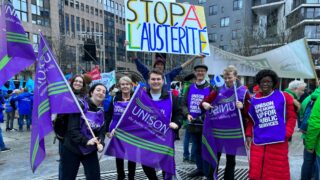The balance of power in English politics will be shifting ever so slightly this year – away from Whitehall and Westminster towards the regions, in the form of the first tranche of directly elected “metro mayors”.
On 4 May, the public will elect mayors in six city-regions: Cambridgeshire and Peterborough, Greater Manchester, Liverpool City Region, Sheffield City Region, Tees Valley, West Midlands and West of England.
These mayors will exercise a significant amount of power over areas such as housing, transport and even health.
And that’s why UNISON has been working hard to ensure that public services are at the forefront of people’s minds during the mayoral elections.
With the support of the general political fund, regions have been promoting the union’s Public Service Champions campaign, and encouraging people to vote for candidates who are prepared to support and protect public services.
James Anthony, who chairs the union’s general political fund, says: “While the mayors have different powers in different parts of the country, what these elections share is an opportunity to raise our concerns about the current state of public services.
“The committee has approved bids to support local mayoral campaigns in Greater Manchester, Tees Valley and West Midlands. This will be backed up by UK-wide advertising that highlights the way in which the invaluable work that our members do and which communities depend upon is being dangerously undermined by austerity.”
Mr Anthony adds that all elections offer an opportunity to achieve the same goal as the union’s Public Service Champions campaign – “to highlight the pressures facing our schools, local government, social care, the NHS and policing, and to send a message to the government that they must change course urgently.”

Born of the Tory Party’s general election manifesto, the Cities and Local Government Devolution Act 2016 has paved the way for a level of regional devolution akin to that currently enjoyed by the London Mayor.
Working alongside combined authorities – which represent existing local councils – the metro mayors will set strategies to grow their area’s economy, while exercising powers over housing, transport and skills.
Their powers will vary, depending on the devolution deals that each city-region has agreed with the government.
For example, Greater Manchester’s mayor will also have responsibility for health and social care and will take over the powers of the police and crime commissioner.

The new role is attracting some high profile politicians, who spy a greater opportunity to effect change than they might have on the back benches or in opposition.
Sadiq Khan has already made the transition in London, and now the former Labour health secretary Andy Burnham (above, speaking to the NHS Confederaton) is the party’s candidate in Greater Manchester.
Another notable candidate is UNISON member Sue Jeffrey, who is contesting Tees Valley for Labour.
Ms Jeffrey, who is leader of Redcar and Cleveland council, is committed to bringing meaningful job growth, sustainability, and investment across the whole of the Tees Valley.
She is also a strong campaigner for the protection and promotion of the region’s public services.
UNISON regional secretary Clare Williams says: “UNISON is proud to support Sue Jeffrey. We know that strong leadership is required to bring investment into the area, provide quality jobs and training, and enhance and protect our vital public services.
“Sue is an experienced campaigner and woman’s rights activist with a tried and tested record in speaking up for the people of the Tees Valley and promoting the interests of the area.”




